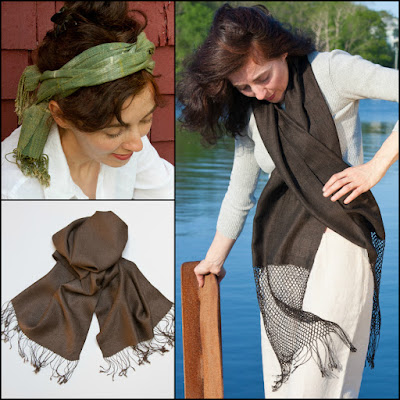“Go where?” the young woman asks me again. Four of us passengers sit on 2 benches in the back of a well-travelled
songteow – the canopied, pick-up trucks that serve as local, shared taxis and travel almost every road in Thailand.
“Kaset Wisai,” I repeat.
That how it goes when Ellen and I travel to a town too small to be served by a bus line. We wait for the
songteow (i.e., “2 benches”) to fill. Until it does, we remain parked or slowly troll the adjacent streets until the required number of passengers is aboard.
Nonetheless, we both enjoy going to Kaset Wisai in Roi-Et province to visit Panmai weaving co-op. Their shophouse is in a thoroughly rural market town experienced by almost no Western foreigners, at least none who don’t have Thai girlfriends.
People stop and stare as Ellen and I pull our wheeled luggage down the street where every morning a bustling fresh market all but fills the wide road. Now in the late afternoon there are only empty stalls, overturned metal ice-chests and splashes of blood from the butchers’ stalls staining the pavement.
One fruit cart perseveres, selling remnants of that morning’s cornucopia of tropical fruit. A single customer is carefully palpating the unusually small mangosteens. “Don’t take any with hard spots,” she councils me in Thai. She seems to assume I’d understand. “Yes, that’s true,” I reply in Thai, “they must be soft all over.” The vendor looks on with amusement. We may be picky but he now has 2 people interested in the small pile of purple fruit.
Ellen’s eyes light up as she sees the spiky green and red rambutans also on offer. “Don’t take any with dark spines,” I caution, sounding not unlike the woman who counseled me.
So we arrive in Kaset Wisai, home to our favourite silk producing group in Thailand.
This year, we’ve gone almost a month earlier than usual. We’ve been advised that later this week the co-op’s 2 staff will travel to Bangkok to sell at the gigantic OTOP sale. OTOP (One Tamboon, One Product) refers to a national juried system for craft and local food products. The OTOP sale outside Bangkok in December is open only to producers who have been judged worthy of 3, 4 or 5 stars. It’s an important place for Panmai to make their village-created silks and cottons available to urban markets. Although we have shopped there in the past, the exhibition is primarily a trade show for Thai retailers looking for choice handicrafts, so almost all the signage is in Thai. This is significant when one realizes that the booths fill several halls large enough to park airplanes.
To get a great selection without subjecting ourselves to that particular madness, we quickly re-arranged our itinerary to arrive here a few days before Mali and Ooung leave. Fortunately, on this our 7th annual visit, we can travel here in 1 day, get settled into 1 of the few hotels and enjoy an evening stroll and dinner, still ready to work the next day.
In the morning we cruise the bustling market that sprawls over several streets. We find fruit, coffee and take-out
khao kapi. I introduce Ellen to this rice dish with at least a half of dozen toppings but its signature fermented shrimp paste, which reminds me of my time living alongside the Gulf of Thailand, is 1 ingredient too many for Ellen.
It’s all so familiar and yet, at the time, so foreign, that our time here fills me with delight.
And that’s even before I see the silk waiting for us in Panmai’s shophouse. But first, we make our greetings, present our token gifts from Canada and show them some photographs of jackets we’ve made from their beautiful silk.
Finally, we dive into the piles of organic silk scarves Mali has brought out for our perusal. She knows we love the strong colours and lively warp stripe patterns she has piled upon the low table. We make 3 passes through the stacks before we are both confident that we’ve made the best choices for our customers. They look happy to have this cash sale of existing inventory on the eve of their departure – a good omen, perhaps, of how they’ll fare in Bangkok.

While Mali prepares the invoice and packs the precious cargo, Ooung goes off for food from the market. Over lunch together, we discuss the group, its members and the number of villages currently involved. They tell us there has been a small decline in numbers but they assure us that the group is still robust, and still the only authentic weaving co-operative from Isaan (northeast Thailand) at OTOP. There are even some younger women joining, they tell us. This is largely due to the fact that in this part of Isaan there are no factories to provide alternate employment. Here, industrious people farm and do whatever they can on the side, or they leave altogether.

After the dishes are cleared and hands are washed, Mali brings out scarves that are more elaborate, and more expensive, than those we have already chosen. She knows that every year I buy a few precious examples of the very best weaving – if for no other reason than, in my own small way, to encourage its practice. She tells me there are fewer than 200 weavers in the group now, but only half of them are expert silk weavers and only a few weave like this. Of course, I buy the white on white scarf that needed a ridiculous number of string heddles and true artistry to create. And I will keep it under wrap until a collector comes along who has the same response that I did.
Pii Plaa (AKA Alleson)
 We've recently relocated to Victoria, BC, where we're happy to find a great interest in ethical consumption.
We've recently relocated to Victoria, BC, where we're happy to find a great interest in ethical consumption.
















































